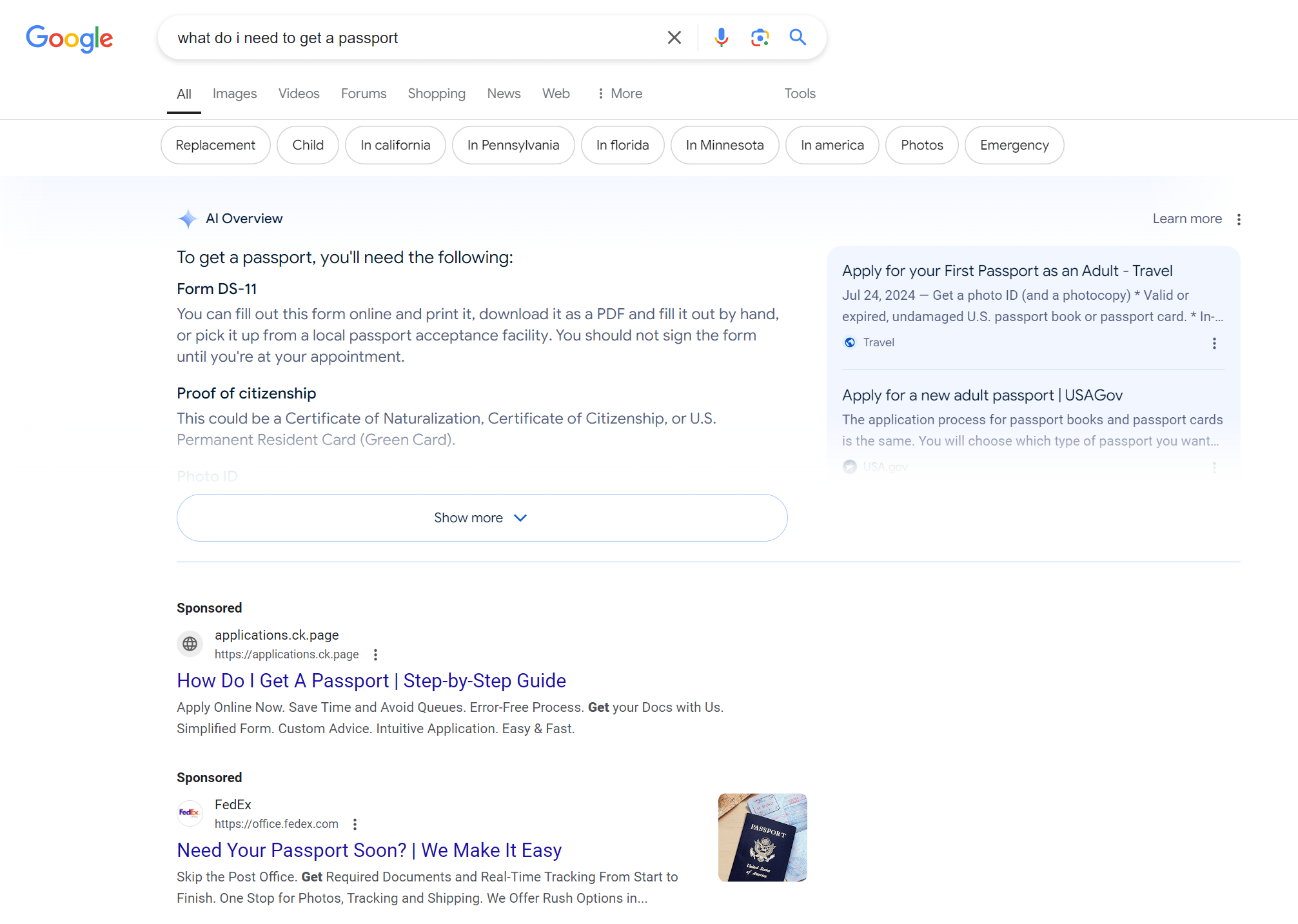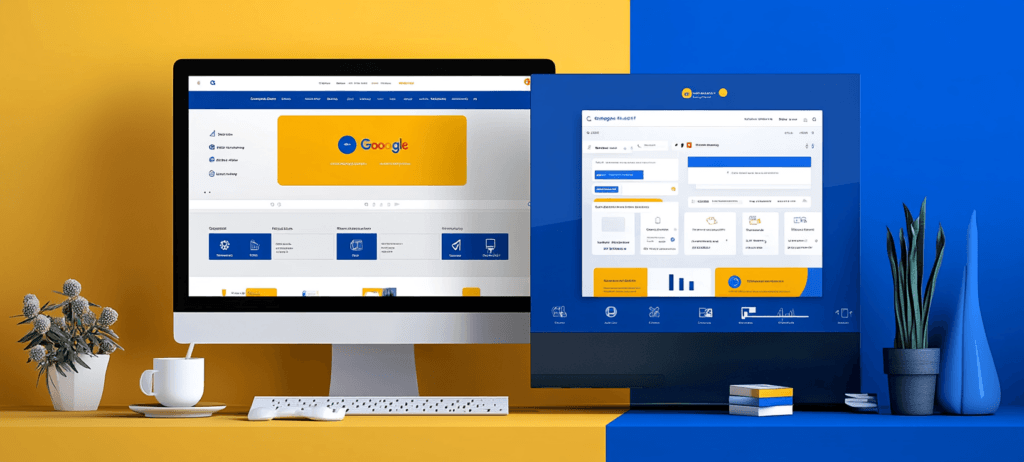-
 Published: Nov 5, 2024
Published: Nov 5, 2024
-
 6 min. read
6 min. read
-
 Celeste Yates
Celeste Yates Content Writer
Content Writer
- Celeste has worked in the online marketing space for twenty years. She has written for sectors including tourism, sustainability, education, lifestyle, food, and marketing. You can find her work featured by Green Building Media South Africa, Stodels Gardening, and The Post House Hotel. In magazines, you may have seen her in The Cape Times, Oprah South Africa, and The Property Magazine. While you can find her writing up on the latest SEO trends and exploring digital techniques during the day, her love of story-telling carries on in enriched games and books after hours.
SearchGPT is making its way to public use. While Google still owns 91.6%of the search market, Answer Engines, like SearchGPT, are slowly making their way into the public’s use and could change the way users interact with the internet. Forever.
In this article, we will look at SearchGPT vs. Google Search, compare traditional and AI-powered search engines, and discuss how they will affect your online presence.
What is SearchGPT?
SearchGPT is OpenAI’s solution for users who want to retrieve information from the web within a conversational context. They have used their ChatGPT Language Models and combined them with their AI technology to create an Answer Engine that scans the web and gives users answers to their queries.

Answer and traditional search engines
Answer search engines are usually back-powered by AI technology. Instead of providing links that have been resourced through algorithms and keyword references like traditional search engines, Answer engines give the user an answer in a concise, conversational manner. The user can choose to find out more information by following through on a citation link, but ideally, they shouldn’t have to.
SearchGPT vs. Google AI — How do they differ?
The biggest difference between the two search engines is how the search results are presented. While Google gives a list of ranked pages, which results in an explorative experience, SearchGPT provides detailed, direct answers.
But it doesn’t end there.
There is also the personalization element. AI-powered engines have the capacity to maintain a conversation. They can give results based on context and prior queries, enabling a user to ask follow-up questions. While Google can personalize results based on past searches and location, it cannot do it within a conversational context.
Google has incorporated AI into its technology, with Google Snippets and Google AI Overview, but these technologies still pull results/text from the original website. It does not attempt to rewrite in a conversational manner.
How do different search engines affect the way users interact with you?
The biggest takeaway between these two searches that you should know about is the way the user interacts with you. With traditional search engines, such as Google, you compete with other sites to get into the top ranks of search results pages (SERPs). You can do that through organic optimization techniques, such as SEO, or you can do it through paid advertising, like pay-per-click (PPC). The goals are to get users to click through to your website and gain traffic. Once the users are on your site, you can drive conversions with high-quality content and easy-to-use calls to action (CTAs) to buy your products or use your service. It’s a straightforward user journey.
But with SearchGPT and other answer search engines, the likelihood of a user clicking through to your site is lower. The answer search engine will provide the user with an answer that they have scanned the web for.
SearchGPT vs. Google AI: General differences
Key Takeaways
- Search results: Google offers search results as a list of ranked websites for the user to explore, while you will see a detailed, conversational, direct answer with SearchGPT.
- Personalization: Google gives results based on past searches and locations, but Search GPT will give you responses within the content of your prior queries.
- Content type: You can see links to existing content across with the web with Google. You can also use Google’s specific media search, such as Image Search, to focus solely on a specific type. With Search GPT it generates content from trained data.
There will be citations that allow the user to click through your page, but often, the user won’t need to. The answer will be given to them in a conversational, concise manner.
Answer search engines like SearchGPT don’t act like the middle man, like Google and other traditional search engines do. They give the end result. This will directly impact how businesses and websites currently optimize and create content for their website. You will have to update your Online strategies for this emerging technology.
SearchGPT vs. Google Search: Key differences that affect your online presence
Let’s dive deeper into the differences between these two types of search engines.
| SearchGPT | ||
| Paid advertising options | Google offers comprehensive PPC advertising with Google Ads. You can focus your target audience on demographics and location and have control over your budget. | Currently, there are no paid advertising options for SearchGTP, therefore businesses cannot promote themselves, their products or services through the platform. |
| SEO | Using optimization tactics, Google uses algorithms to give websites a chance to appear in front of customers. | SearchGPT delivers direct answers, not ranked. Therefore, organic search strategies are not relevant. |
| Answer Engine Optimization (AEO) | Optimizing for AEO can potentially aid you with your SEO. | Content that gives direct answers, relevant insights and tools will be prioritized. |
| Content Marketing | High-quality, authoritative content is critical for SEO. | High-quality, authoritative content is critical for AEO. |
| User Intent and Engagement | Google matches search intent by giving a mix of web pages, images and video results. | SearchGPT uses conversational responses, so websites can use this to offer tailored advice or product recommendations. Answer engines also use informational marketing, rather than promotional tactics, which gives a higher user engagement. |
| Customer acquisition | Google uses paid ads, SEO, and local search results to give websites immediate conversion opportunities | Focuses more on informing and nurturing leads. |
| Analytics | Detailed analytics through Google Analytics are used to track traffic, conversion rates, and customer behavior. | Currently, no native analytics tools. |
| Long-term strategy | It requires continuous investment in SEO, PPC, and content marketing to maintain ranking and visibility. | Less competitive market and focuses on content optimization and direct engagement rather than ranking. |
Bonus read! Find out how to optimize for AEO
What does the future hold for Google and SearchGPT?
Google has already started implementing AI-driven search options and integrating them into its current results. They started this a while ago with their Snippets, which are improving and providing more versatility with their AI Overview. It will essentially give users an AI-powered response to direct queries but still offer website rankings underneath.

This will change Google from a traditional search engine, into a hybrid, giving users the best of both worlds. At the time of this article, this is still being tested in certain parts of the world and has yet to be rolled out as a standard feature.
SearchGPT and other answer search engines will be creating a new way for users to access information on the web that promises to be cleaner and more conversational, personalized.
Not to mention, advertising on these AI search engines will become possible, allowing users to receive more relevant ads in a more conversational format that could make paid advertising more effective.
Business and content creators will have to learn, adapt, and modify the way they create content to interact with users on this new platform. Time will tell what techniques and optimization methods work best.
Overall, it does mean that Google might potentially lose its dominance in the search engine market and have to share its space with this new, emerging technology. More search engines will mean more opportunities for businesses to optimize and strategize for, as there will be more top spots now to compete over.
Start optimizing for AEO today!
Get your online presence optimized for AI technology today to answer search engines and stay ahead of the curve. The innovative team at WebFX can implement modifications to your website and content strategy to cater to this new potential market share.
Call us now at 888-601-5359 to talk to a strategist immediately and begin the process. Stay ahead of the technology search curve with WebFX and get a further understanding of how emerging trends affect your business.
-
 Celeste has worked in the online marketing space for twenty years. She has written for sectors including tourism, sustainability, education, lifestyle, food, and marketing. You can find her work featured by Green Building Media South Africa, Stodels Gardening, and The Post House Hotel. In magazines, you may have seen her in The Cape Times, Oprah South Africa, and The Property Magazine. While you can find her writing up on the latest SEO trends and exploring digital techniques during the day, her love of story-telling carries on in enriched games and books after hours.
Celeste has worked in the online marketing space for twenty years. She has written for sectors including tourism, sustainability, education, lifestyle, food, and marketing. You can find her work featured by Green Building Media South Africa, Stodels Gardening, and The Post House Hotel. In magazines, you may have seen her in The Cape Times, Oprah South Africa, and The Property Magazine. While you can find her writing up on the latest SEO trends and exploring digital techniques during the day, her love of story-telling carries on in enriched games and books after hours. -

WebFX is a full-service marketing agency with 1,100+ client reviews and a 4.9-star rating on Clutch! Find out how our expert team and revenue-accelerating tech can drive results for you! Learn more
Try our free Marketing Calculator
Craft a tailored online marketing strategy! Utilize our free Internet marketing calculator for a custom plan based on your location, reach, timeframe, and budget.
Plan Your Marketing Budget

SEO Success with KOA

Proven Marketing Strategies
Try our free Marketing Calculator
Craft a tailored online marketing strategy! Utilize our free Internet marketing calculator for a custom plan based on your location, reach, timeframe, and budget.
Plan Your Marketing Budget
What to read next





